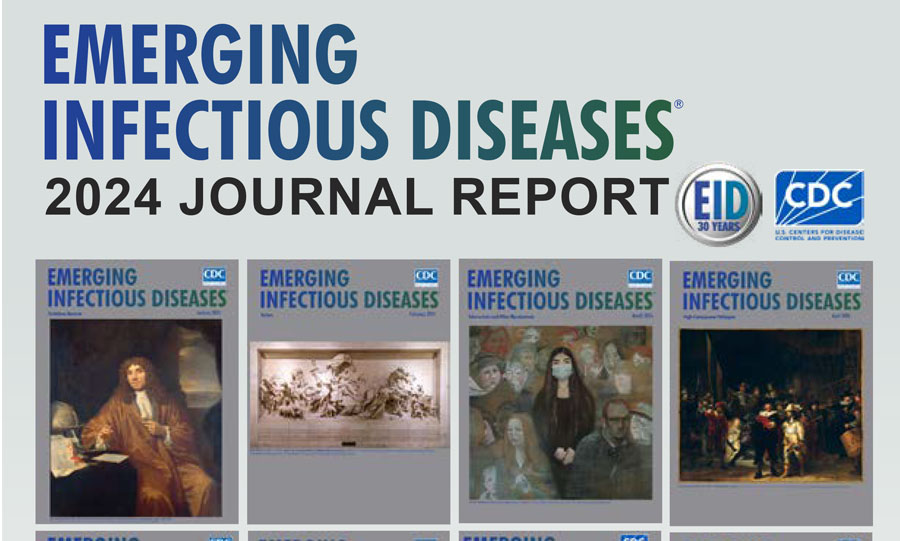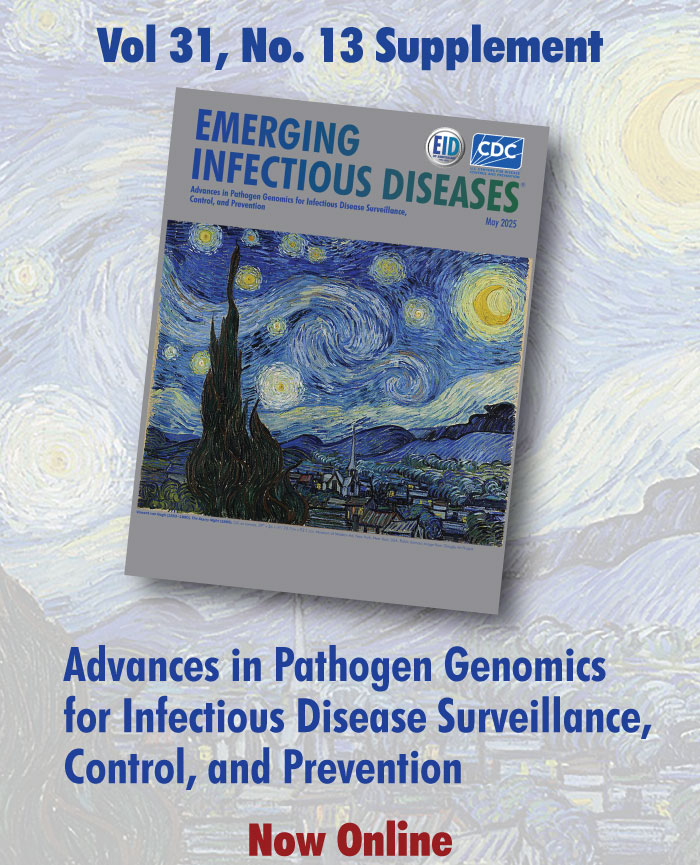Early Release
Disclaimer: Early release articles are not considered as final versions. Any changes will be reflected in the online version in the month the article is officially released.
Volume 31, Number 12—December 2025
Synopses
-
Reemergence of Yellow Fever, Magdalena Valley, Colombia, 2024–2025
Yellow fever, a zoonotic arboviral disease, has reemerged in Colombia, triggering a major outbreak in the country. During 2024 through mid-2025, a total of 132 human cases and 68 infections in nonhuman primates were confirmed, primarily in the department of Tolima, historically considered a low-risk area. We analyzed the historical and current epidemiology of yellow fever in Colombia, highlighting ecologic, social, and surveillance factors that contributed to the outbreak. Low vaccination coverage, insufficient epizootic and entomological surveillance, deforestation, habitat fragmentation, and limited application of One Health approaches have all exacerbated the situation. The high mortality rate of nonhuman primate species indicated a more profound ecologic crisis. Immediate, comprehensive measures, including mass vaccination, genomic surveillance, and integrated One Health frameworks, are urgently needed. Colombia’s experience underscores the need to reevaluate risk stratification and preparedness strategies across the Americas to prevent future yellow fever outbreaks in previously unaffected regions.
-
Retrospective Multicenter Study of Human Granulocytic Anaplasmosis, France, 2012–2024
Human granulocytic anaplasmosis (HGA), caused by Anaplasma phagocytophilum transmitted through tick bites, remains poorly documented in France. We conducted a retrospective, multicenter study of cases in Alsace during 2012–2024, including 39 HGA episodes in 38 patients PCR positive for A. phagocytophilum. Most (63.2%) patients were men, median age was 60.5 years, and 76.3% lived in rural areas. A tick bite was reported in 61.6% of cases. Frequent symptoms included fever (97.4%), fatigue (61.5%), and headache (61.5%). Laboratory findings showed elevated C-reactive protein (100%), thrombocytopenia (94.9%), leukopenia (59.0%), and cytolysis (66.7%). One patient had secondary hemophagocytic lymphohistiocytosis. Most (87.2%) patients were hospitalized; none required intensive care unit admission. Doxycycline was administered in 29 cases, and all patients recovered. HGA should be considered in febrile patients with recent tick exposure and cytopenia. Although often benign, rare severe HGA forms can occur and justify increased clinical awareness, especially in A. phagocytophilum–endemic areas.
-
Two Concurrent Outbreaks of Listeria monocytogenes Infections Linked to Packaged Salads, United States, 2014–2022
We describe 2 genetically unrelated outbreaks of Listeria monocytogenes infections (outbreak A and outbreak B) linked to packaged salads from 2 different firms that were investigated simultaneously in 2021. Combined, the outbreaks caused 30 illnesses, 27 hospitalizations, and 4 deaths over 8 years. Those investigations led to recalls of product from 2 different firms and highlight how L. monocytogenes contamination can persist for long periods and cause illnesses over many years. Outbreak A was investigated 3 times with illnesses occurring over 8 years, whereas illnesses in outbreak B occurred over 5 years. Both outbreaks illustrate the importance of routine and epidemiologically directed sampling by state partners, without which these outbreaks likely would have gone unsolved. The outbreaks were the second and third multistate outbreaks of listeriosis linked to packaged salads, providing further documentation of the potential for L. monocytogenes infections from consumption of contaminated packaged salads.
Research
-
Silent Propagation of Classical Scrapie Prions in Homozygous K222 Transgenic Mice
Classical scrapie affects sheep and goats. To control prevalence in sheep, the European Union initiated breeding programs targeting resilient genotypes. Although certain goat polymorphisms, such as Q222K, are linked to resistance, specific breeding programs have not been implemented. Hemizygous transgenic mice carrying the goat K222 cellular prion protein (PrP) allele (K222-Tg516) exhibited resistance to several classical scrapie isolates. We inoculated homozygous K222-Tg516 and Q222-Tg501 mice with various scrapie isolates. Homozygous K222-Tg516 mice reached the end of their lifespan without exhibiting clinical signs; we observed brain proteinase K–resistant PrP accumulation in those mice that was lower than in Q222-Tg501 mice. Histologically, K222-Tg516 brains lacked prion-related lesions, except for the presence of few isolated scrapie PrP plaques in cases of isolates highly adapted to the K222-PrPC environment. Our findings caution against including that polymorphism in breeding programs, because it could lead to emergence of asymptomatic silent prion carriers of classical scrapie among goat populations.
-
Oral Transmission of Classical Bovine Spongiform Encephalopathy in ARR/ARR Sheep
Selection for the A136R154R171 PRNP allele is known to curb classical scrapie in sheep, and we expected it to minimize the risk for classical bovine spongiform encephalopathy (c-BSE) propagation. We orally challenged newborn ARR/ARR and ARQ/ARQ lambs with ovine-passaged c-BSE. Contrary to our expectations, prion disease developed in all ARR/ARR lambs after markedly longer incubation times (≈50 months) than ARQ/ARQ controls (≈20 months). Tissue distribution of the abnormal isoform of prion protein (PrP) in clinically affected ARR/ARR sheep largely mirrored tissue distribution seen in ARQ/ARQ animals. Bioassays in bovine- and human-PrP transgenic mice showed that passage through ARR/ARR sheep did not increase the agent’s zoonotic potential. Transmission efficiency in human normal cellular isoform PrP-expressing mice remained similar to cattle c-BSE and lower than ARQ-passaged c-BSE. Our data reveal the limitations of breeding exclusively for ARR when the objective is to mitigate c-BSE risk and underscore the need to maintain specific-risk-material removal and surveillance programs.
- Pregnancy Outcomes after Exposure to Tuberculosis Treatment in Phase 3 Clinical Trial, 2016–2020
-
Guinea Pig Model for Lassa Virus Infection of Reproductive Tract and Considerations for Sexual and Vertical Transmission
Lassa virus (LASV) causes Lassa fever; mortality rates are higher in pregnant women, and fetal infection and death are possible. Sexual transmission after recovery from Lassa fever has occurred. Using virus strains that are lethal (Josiah) or nonlethal (NJ-2015) in guinea pigs, we characterized LASV-associated pathology and reproductive tissue tropism in male and female animals. Uterus, ovary, and epididymis were the earliest and most affected tissues; perivascular lymphocytic inflammation was prominent at lethal timepoints and persisted in survivors after clinical disease. LASV-Josiah RNA was detected in reproductive tissues by 4 days postinfection (dpi). Virus localized by immunohistochemistry and in situ hybridization predominantly within vascular smooth muscle and interstitial mesenchymal cells and was widespread in reproductive tissues in lethal infections (12–25 dpi) but not detected in survivors (41–42 dpi). Using a physiologically relevant model, we describe reproductive tissue targets to further elucidate LASV infection and effects on reproductive health and virus transmission.
Dispatches
-
Healthcare Worker Attitudes and Perceptions toward Ebola Vaccine, United States, 2024
Our 2024 survey of eligible US healthcare workers found that 48% of unvaccinated healthcare workers are interested in receiving Ebola virus vaccine. The Advisory Committee on Immunization Practices recommended vaccination for healthcare workers at highest risk for occupational exposure to Zaire ebolavirus (Orthoebolavirus zairense). Addressing concerns identified by survey respondents might improve vaccine acceptance.
-
Novel Highly Pathogenic Avian Influenza A(H5N1) Virus, Argentina, 2025
Genomic sequencing of reemerging highly pathogenic avian influenza A(H5N1) virus detected in Argentina in February 2025 revealed novel triple-reassortant viruses containing gene segments from Eurasian H5N1 and low pathogenicity viruses from South and North American lineages. Our findings highlight continued evolution and diversification of clade 2.3.4.4b H5N1 in the Americas.
-
West Nile Virus–Associated Hemophagocytic Lymphohistiocytosis, Switzerland
A 62-year-old patient was hospitalized in Geneva, Switzerland, with an atypical manifestation of West Nile virus infection. Initially, he sought care for febrile diarrhea and vomiting; his condition deteriorated and hemophagocytic lymphohistiocytosis and meningoencephalitis developed. Corticosteroids improved his condition. We used high-throughput sequencing and ophthalmologic findings to diagnose West Nile virus.
-
Persistent Infection in Harbor Seals 12–13 Years after Phocine Distemper Virus Epizootics in 1988 and 2002, North Sea
Phocine distemper virus caused epizootics of fatal pneumonia in North Sea harbor seals in 1988 and 2002. Two seals that stranded years later were infected with defective phocine distemper virus variants that caused severe encephalomyelitis. Old seal encephalitis resembled subacute sclerosing panencephalitis in humans and old dog encephalitis in canines.
-
Pancreatic Schistosomiasis, China, 2020–2024
Schistosomiasis is a globally prevalent parasitic infection, but pancreatic involvement is extremely rare. In this article, we report 4 cases of pancreatic schistosomiasis from endemic regions in China. The possible link between schistosomiasis and pancreatic malignancy deserves further study. These cases underscore the diagnostic challenge of pancreatic schistosomiasis.
-
Case of Congenital Tularemia with Neuroinvasive Disease, Utah, USA
We diagnosed neuroinvasive tularemia in a neonate in Utah who had culture-negative pleocytosis in cerebrospinal fluid, rim-enhancing lesions on brain magnetic resonance imaging, and blood microbial cell-free DNA Francisella tularensis detection. Maternal history, serologic testing, and Francisella sp. identified in the fallopian tube by immunohistochemistry and 16S rRNA gene PCR strongly support congenital infection.
-
Human Infection by Zoonotic Eye Fluke Philophthalmus lacrymosus, South America
We report a case of severe conjunctivitis in a traveler infected with a Philophthalmus lacrymosus eye fluke, probably acquired on the Galápagos Islands in Ecuador. This zoonotic parasite is endemic in Brazil and Venezuela, where it has been reported in birds and capybaras.
-
Highly Pathogenic Avian Influenza A(H5N1) Clade 2.3.4.4b Virus Infection in Poultry Farm Workers, Washington, USA, 2024
Poultry workers in Washington, USA, were infected with highly pathogenic avian influenza A(H5N1) virus and recovered. The viruses were clade 2.3.4.4b genotype D1.1, closely related to viruses causing poultry outbreaks. Continued surveillance and testing for influenza A(H5) clade 2.3.4.4b viruses remain essential for risk assessment and pandemic preparedness of zoonotic influenza viruses.
-
Bat Reovirus as Cause of Acute Respiratory Disease and Encephalitis in Humans, Bangladesh, 2022–2023
We report 5 patients in Bangladesh presumed to have Nipah virus infections after consuming date palm sap. PCR and serology for Nipah virus were negative, but high-throughput sequencing identified Pteropine orthoreovirus in archived throat swab samples and virus cultures. This batborne virus should be considered in differential diagnosis of Nipah-like illnesses.
-
Macrolide Resistance and P1 Cytadhesin Genotyping of Mycoplasma pneumoniae during Outbreak, Canada, 2024–2025
We investigated macrolide resistance and P1 genotypes of Mycoplasma pneumoniae during the 2024–2025 outbreak in Hamilton, Ontario, Canada. Macrolide resistance remained stable at ≈10%–20%, but significant shifts in P1 genotype distribution and resistance rates in P1 types occurred, indicating notable changes in M. pneumoniae molecular epidemiology in Ontario since 2011–2012.
- Abnormal Prion Protein in Nasal Swab Specimens of Macaques Infected with Creutzfeldt-Jakob Disease
Research Letters
-
Wild and Domestic Animal Exposure among Deceased Persons Referred for Organ Procurement, United States
Rabies is transmissible through transplantation. Wild mammal bites or scratches carry a high risk for rabies, but their frequency among organ donors is unknown. During 2024, an estimated 12 (95% CI 7–20; 0.07%) of 16,989 deceased US donors had high-risk exposures. Identifying such exposures can mitigate rabies transmission to transplant recipients.
-
Metatranscriptomic Identification of Trubanaman Virus Sequences in Patient with Encephalitis, Australia
Using metatranscriptomics, we identified Trubanaman virus in cerebrospinal fluid from a severely immunocompromised man who died of encephalitis in Queensland, Australia. Virus sequences were related to orthobunyaviruses previously detected in mosquitoes in Australia. Testing for other causes yielded negative results, suggesting that Trubanaman virus was the cause of this fatal encephalitis case.
-
Trombiculiasis in 4 Dogs with Neurologic Signs, the Netherlands, 2024
Sporadic cases of trombiculiasis have been reported as causing neurologic signs in dogs. We report a cluster of trombiculiasis cases (outbreak) in the province of Noord-Holland, the Netherlands, associated with Neotrombicula autumnalis mite infestation. Veterinarians should consider N. autumnalis infestation in differential diagnoses for acute onset neurologic signs in dogs.
-
Enhanced Risk for Epidemic Cholera Transmission, Haiti
Sporadic cholera outbreaks continue to occur in Haiti. We used a novel space-time analysis to gain insight from limited government surveillance data. We identified concerning patterns of disease spread in areas known to be at high risk for epidemic cholera in and around the capital city of Port-au-Prince.
-
Carbapenem-Resistant Salmonella Typhi Infection in Traveler Returning to Germany from India, 2024
We report on a carbapenem-, extended spectrum β-lactam-, fluoroquinolone-, and tetracycline-resistant Salmonella enterica serovar Typhi strain in a patient returning to Germany from India. Considering the recent emergence of extensively drug-resistant Salmonella Typhi strains, further expansion of antibiotic resistance to carbapenems poses a serious threat for typhoid fever treatment.
-
Macrolide-Resistant Mycoplasma pneumoniae in Children, Ohio, USA
As the COVID-19 pandemic waned, Mycoplasma pneumoniae reemerged in the pediatric population in Ohio, USA. The rate of macrolide-resistant M. pneumoniae fluctuated by month, ranging from 0 to 8.7%, and mirrored the azithromycin prescribing rate. Real-time surveillance for macrolide-resistant M. pneumoniae provides accurate information for management of children with these infections.
-
Influenza D Virus in Black Donkeys, Northern China
Influenza D virus (IDV) is prevalent in cattle in China, and a risk for spillover to other species exists. We detected IDV antibodies in 6/315 of black donkeys in northern China, suggesting cattle-to-donkey transmission and demonstrating the expanding host range of IDV and the need for reassessment of cross-species transmission risks.
Letter
Online Report
-
Diphtheria Antitoxin Production and Procurement Practices and Challenges
Treatment of respiratory diphtheria requires prompt administration of equine diphtheria antitoxin (DAT) to neutralize circulating toxin. We conducted surveys of key procurement agencies and manufacturers currently engaged in DAT manufacturing or procurement, along with key informant interviews with developers of monoclonal antibodies. Our findings indicate that prices and availability of DAT vary and that prediction of demand is challenging for both manufacturers and procurement agencies. Substantial concerns were raised over the inability to obtain enough DAT to respond to increasing global outbreaks. Monoclonal antibody developers noted financial challenges in advancing their clinical and manufacturing progress.
Volume 32, Number 1—January 2026
Synopses
- Pulmonary Histoplasmosis, Taiwan, 1997–2024
- Case Series of Bacteremia Associated with Probiotic Use in Children after Cardiac Surgery
- Two Cases of Q Fever in Pregnancy, including Management of the Newborn, Australia
Research
- Emergence of NDM-14–Producing Klebsiella pneumoniae Sequence Type 147 Clone in Spain and Outbreak in the Canary Islands
- Reduced RSV-Related Emergency Department Visits and Hospitalizations in Infants after Universal Immunization, Italy, 2024–2025
- Group A Streptococcus Meningitis, United States, 1997–2022
- Genomic Insights into Marburg Virus Strains from 2023 and 2025 Outbreaks in Kagera, Tanzania
- Effect of Chloramine Disinfection of Community Water System on Legionnaires’ Disease Outbreak, Minnesota, United States
Dispatches
- Identification of Sphingobacterium hotanense Infections, North America, 2020–2025
- Dermacentor occidentalis Ticks Linked to Rickettsia lanei Infections, California, USA
Research Letter
- Mycobacterium decipiens Infection in Patient Treated with Anti-TNFα Therapy, France, 2024
Online Report
- Integrating Prevention and Response at the Crossroads of Henipavirus Preparedness, Hendra@30 Conference, 2024
Winter Supplement
- Postinfectious Syndromes and Long-Term Sequelae after Giardia Infections
-
Nonspecific Symptoms Attributable to Lyme Disease in High-Incidence Areas, United States, 2017–2021
For some patients who have Lyme disease (LD), nonspecific symptoms can persist after treatment and impair quality of life. Estimating the frequency and duration of such symptoms is challenging. Using commercial insurance claims data from 2017–2021 for enrollees residing in states where LD is common, we identified 24,503 case-patients with LD and matched them (1:5) with 122,095 control-patients with other diagnoses by demographics, medical service date, and inpatient/outpatient setting. We compared relative frequencies of diagnosis codes for pain, fatigue, and cognitive difficulties between case-patients and control-patients in the year after diagnosis. Those symptom codes occurred 5.0% more frequently among case-patients than among control-patients and comprised »11.0% of the total symptom codes among case-patients. Symptom code frequency among case-patients declined significantly in the 6–12 months after LD diagnosis and reached levels similar to control-patients by the end of the year, with the exception of fatigue.
- Progress Toward Understanding Infection-Associated Chronic Conditions and Illnesses
-
Persistence of Symptoms among Commercially Insured Patients with Coccidioidomycosis, United States, 2017–2023
Some patients with coccidioidomycosis experience prolonged respiratory and systemic symptoms. However, data on prevalence and persistence of most symptoms are lacking. Using an insurance claims database, we identified patients with coccidioidomycosis diagnoses in the United States during 2017–2023. We assessed prevalence of associated symptoms from 6 months before to 1 year after first diagnosis code (index date) and compared post–index date prevalence to baseline (within 6 to 4 months before index date). Among 2,640 patients, cough (20.8%), dyspnea (13.0%), and fatigue (8.8%) were the most common symptoms at index date. Dyspnea and erythema nodosum were elevated 3–6 months post–index date (p<0.03), and fatigue, headache, joint pain, and weakness were elevated 9–12 months post–index date compared with baseline (p<0.05).These findings demonstrate that symptoms can persist in coccidioidomycosis patients, which could help inform clinical management and refine estimates of the health and economic burden of coccidioidomycosis.
-
Long-Term Illness in Adults Hospitalized for Respiratory Syncytial Virus Disease, United States, February 2022–September 2023
Respiratory syncytial virus (RSV) can cause severe illness, but little is known about long-term consequences in hospitalized adults. We surveyed adults (>18 years of age) who survived hospitalization for RSV or COVID-19 during February 2022–September 2023 about physical functioning and quality of life; surveys were conducted 6–12 months after hospitalization. We compared outcomes after RSV hospitalization by age (<60 vs. >60 years) and to those hospitalized for COVID-19 by using multivariable regression models. Among 146 adults hospitalized with RSV, 27.4% reported severe breathlessness and 21.9% poor quality of life at follow-up. Few differences were seen in posthospital illness by age. After adjustment, participants with RSV had 1.81 (95% CI 1.08–3.04) times increased odds of worse dyspnea than did those with COVID-19. Participants reported functional and quality of life impairments after RSV hospitalization, regardless of age, and a postdischarge sequelae constellation similar to that for those hospitalized for COVID-19.
- Thrombotic Events and Stroke in the Year After Sars-Cov-2 or Other Acute Respiratory Infection




